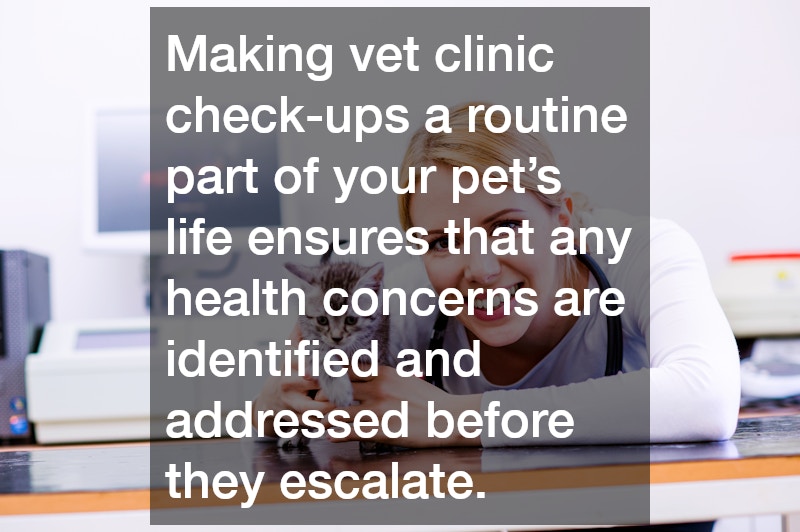Pet owners often go to great lengths to ensure their animals live long, healthy and fulfilling lives. This includes a good diet, regular exercise and a loving home. However, one aspect of pet care that is sometimes overlooked is the importance of regular check-ups at a trusted vet clinic. Much like humans, animals benefit significantly from routine medical assessments.
These visits not only safeguard their immediate health but also play a vital role in preventing long-term issues that could become serious or even life-threatening.
Preventative Care: Catching Problems Early
One of the primary reasons for scheduling regular visits to a vet clinic is preventative care. Many health conditions that affect pets, such as dental disease, parasites, obesity and arthritis, develop gradually over time. Without professional intervention, these issues can remain undetected until they become severe. Early diagnosis allows for timely treatment, often reducing the need for invasive procedures or prolonged medication. Moreover, catching a condition early can prevent unnecessary discomfort and improve your pet’s quality of life.
Preventative care also includes vaccinations, parasite control and routine blood tests. These services protect pets from common yet potentially dangerous diseases like parvovirus, distemper and heartworm. A consistent check-up schedule ensures vaccinations remain up to date and that your pet’s overall health is being monitored with precision. Regular visits help veterinarians build a complete health profile over time, which is invaluable when determining the best care for your animal.
Managing Chronic Conditions Effectively
Many pets, especially as they age, develop chronic conditions that require ongoing attention. Issues like diabetes, kidney disease, or allergies need consistent monitoring and adjustment of treatment plans. A vet clinic is best equipped to offer the tools and medical knowledge required to manage these conditions effectively. Regular check-ups allow for changes in medication or diet to be made based on the pet’s evolving health needs, ensuring a more comfortable and balanced life.
Chronic health issues can often progress silently, showing few visible signs in the early stages. By the time a pet shows symptoms, the condition may have already advanced. Veterinarians trained in animal diagnostics are skilled at identifying subtle shifts in health during routine exams. This proactive approach can reduce the risk of complications and provide peace of mind to pet owners who may otherwise struggle to recognise when something is wrong.
Monitoring Behavioural & Nutritional Needs
Pets can’t tell us when they feel unwell and changes in behaviour are sometimes the only clues that something is amiss. Regular check-ups give pet owners an opportunity to discuss even minor behavioural changes with a professional. Whether it’s a sudden change in appetite, restlessness, aggression, or lethargy, a vet can help determine if the cause is medical, environmental, or emotional.
Nutrition is another crucial element in maintaining a pet’s health. The dietary needs of animals change depending on their age, breed, activity level and health status. During check-ups, vets can assess your pet’s weight, muscle tone and overall physical condition, then recommend tailored dietary solutions. Whether your pet needs to lose weight, build strength, or address nutrient deficiencies, a visit to the vet clinic can provide the expert guidance required to meet those goals.
Supporting a Long & Healthy Life
Just like routine doctor visits help humans maintain long-term health, consistent vet clinic check-ups support pets in living longer, more vibrant lives. Senior pets, in particular, benefit immensely from biannual visits, as ageing increases their susceptibility to disease and discomfort. Many conditions related to age, such as arthritis or vision impairment, can be mitigated or managed more comfortably if addressed early.
Furthermore, regular visits to the vet help establish a trusting relationship between the veterinarian, the pet and the owner. Animals become more comfortable with the clinical setting over time, reducing anxiety and making future visits smoother. This trust also helps veterinarians detect subtle behavioural cues that might indicate underlying health concerns.
Building a Comprehensive Medical History
Consistent check-ups allow your chosen vet clinic to develop a detailed medical history for your pet. This includes records of vaccinations, surgeries, weight trends and recurring issues. A comprehensive history is a critical tool for any future medical care, particularly in emergencies when quick, informed decisions are essential.
Medical records compiled over time give vets the context they need to interpret changes in your pet’s condition more accurately. These insights can influence treatment options, preventative strategies and even the early detection of genetic or breed-specific concerns. It’s a long-term investment in your pet’s overall wellbeing that pays off in better health outcomes and more personalised care.
The Lifesaving Value of Routine Vet Visits
Regular visits to the vet clinic are far more than a formality—they are a cornerstone of responsible pet ownership. These check-ups provide essential preventative care, enable the management of chronic conditions, monitor behavioural and nutritional needs and help build a solid foundation for long-term health. By attending regular appointments, pet owners not only protect their beloved animals from illness and discomfort but also enhance their quality of life through each stage of development.
Making vet clinic check-ups a routine part of your pet’s life ensures that any health concerns are identified and addressed before they escalate. With the guidance of a skilled veterinarian, you can make informed decisions that keep your pet healthy, active and by your side for as long as possible.


